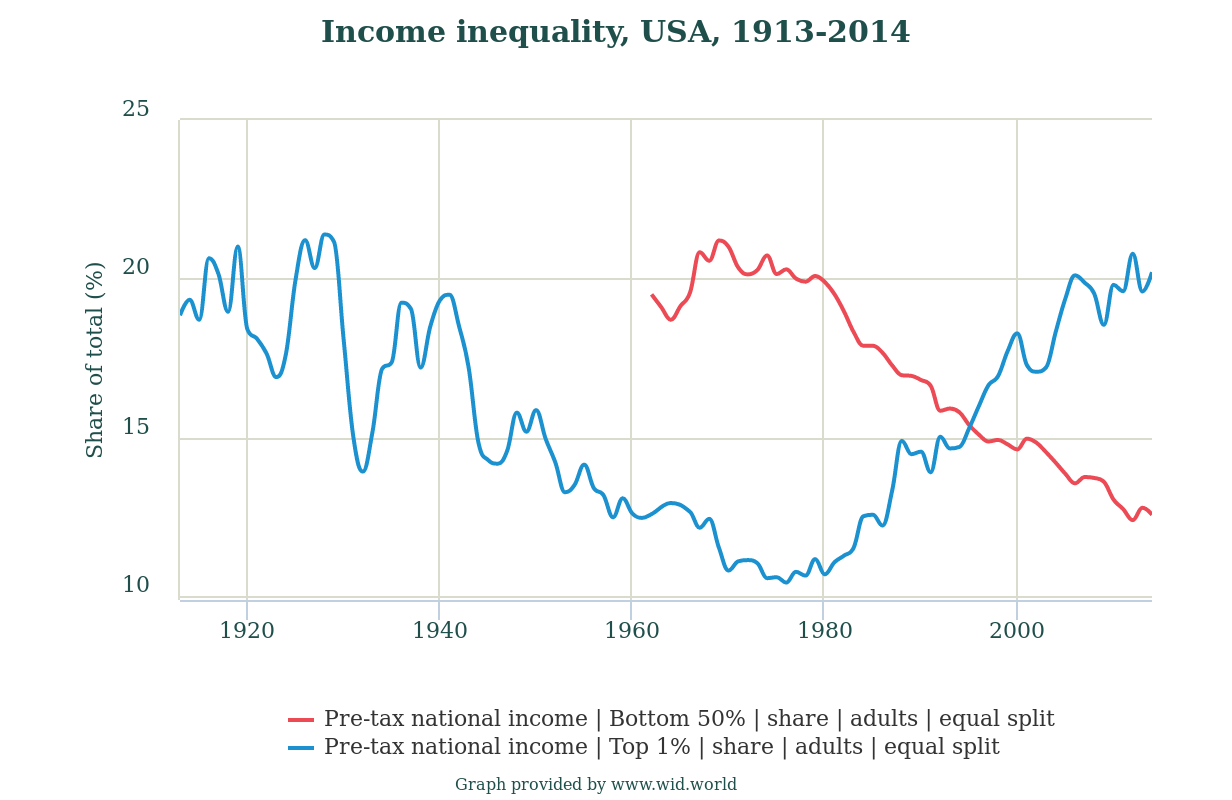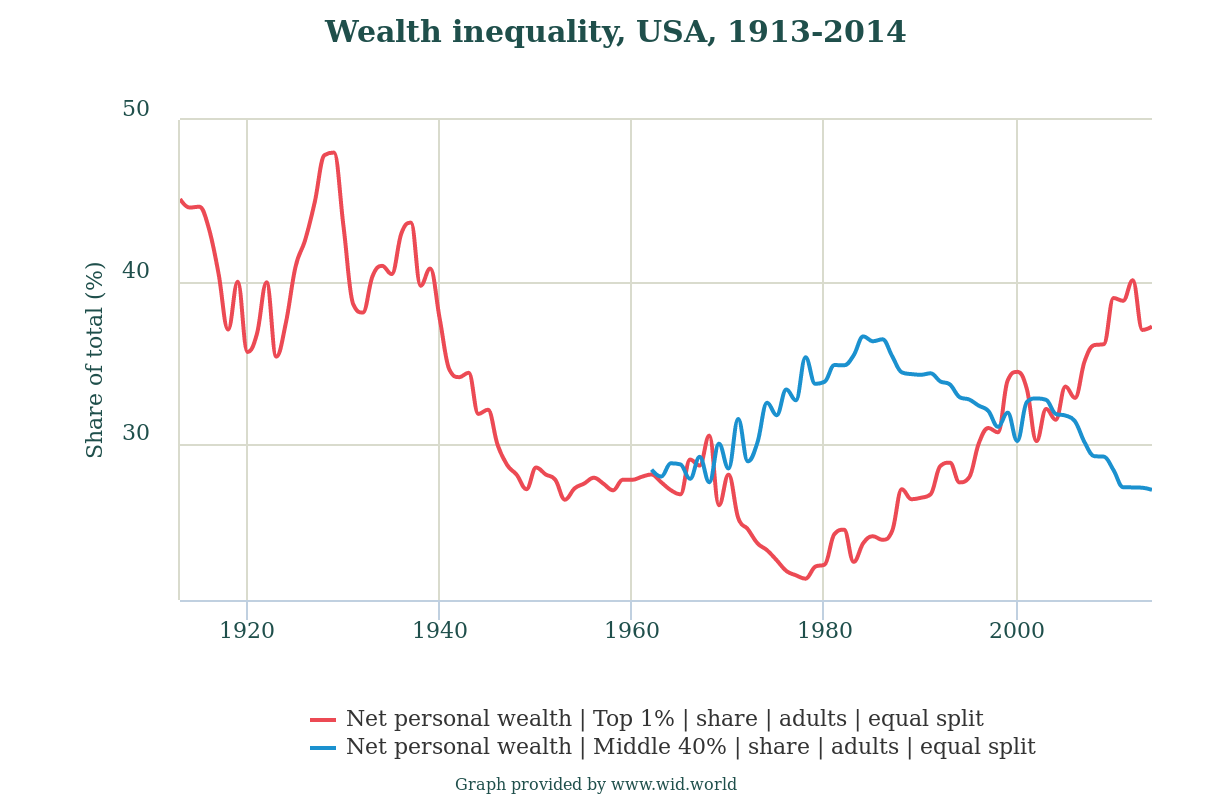We hear a lot about the “booming economy” with the GDP rising at a 2.3% rate and unemployment at a low 4%, but we still hear a lot of people grumbling about feeling left out and insecure. So why should anyone feel insecure in a booming economy? Might it have something to do with the economy booming for some people but not others? Well, it is, and it has been that way for several years now.
The median household income in the U.S. in 2017 was $59,034 (half of all households had incomes less than this amount). The total reported personal income for the entire country last year was $17.1 trillion1. The top 1% made 23% of all reported income which means that the top 1% made $3.9 trillion. Given a population of 325 million and an average of 2.54 persons per household, the average income for the top 1% (1.28 million households) was $2,950,000 per household. Meanwhile, the bottom 50% of the population (64 million households) shared 12% of the total income, $1.9 trillion, so their average income was $31,000 per household.
What about trends. A look at the graphs2 below show that the share of total income received by the top 1% has been climbing pretty steadily since about 1980 while the share of total income for the bottom 50% has been falling steadily. By the same token, the share of net personal wealth has risen dramatically for the top 1% and fallen for the bottom 50% since about 1980. Nationally, the U.S. ranks 41 out of 156 countries world wide (and the highest among all the economically developed countries) in income inequality according to the CIA World Fact Book. But it didn’t used to be that way. What has happened since 1980 to reverse a trend toward both income and wealth equality that had been in place since WWII?


Several things have happened to cause this trend towards greater and greater inequality, some of which resulted from technology changes, but most of which resulted from government policy changes. Technology, mostly in the form of automation has had a dramatic effect on employment and wages. Numerous high wage earners have been laid off or forced into lower wage positions as higher paying jobs were automated. By itself, however, this would never have caused the rise in inequality that we have experienced.
The primary causes of increasing inequality are deliberately enacted government policies. First among these are three major tax cuts since 1980 that primarily benefited the corporations and the wealthy. Second is the laissez faire approach to multinational corporations permitting them to off-shore higher paying manufacturing and information technology jobs without any compensation or penalties3, and to create tax havens in which they can avoid taxes. Third is the emasculation of unions that has eroded the bargaining power of workers. Another cause is the government support of arbitration clauses which rob workers of the right to sue employers for abuse or malfeasance. Still another cause is federal and state government cuts for higher education which has caused the cost of college education to skyrocket and create lifetime debt for students. Then there is the extension of patents on pharmaceuticals that allow big pharma to charge exorbitant prices for drugs together with the prohibition against importing drugs from foreign countries where generic drugs are less expensive. And we mustn’t forget the government support for the healthcare industry (including insurance companies) that costs Americans twice as much as the next most expensive country. Finally, there is deregulation which has allowed Wall St. bankers to gamble with our savings and has relaxed numerous constraints on corporations that improved their profits. As a result of these and numerous other policies, most workers today are earning the same or less now than 10 years ago, have lost many of their benefits, have little or no savings, are deep in debt, and can be laid off or fired at any time while the corporations get bigger and fatter and the wealthy scarf up more and more of the nations total wealth. Is it really any wonder why so many people feel left out and insecure?
The government policies mentioned above are policies that were voted into law at the behest of corporate lobbyists and wealthy individuals who pay the lion’s share of the cost of election campaigns (and provide favors for cooperating politicians). As a case in point, in the midterm election of 2010, 68% of all congressional campaign contributions were funded by 0.26% (that’s one fourth of 1 percent) of the population and about 90% of that money went to incumbents.4 5 This clearly demonstrates how the big spenders purchase legislation that improves the profits and increases the wealth of the corporations and the wealthy. It is clear evidence that rising inequality is a result of deliberate actions on the part of the corporations and the wealthy working together with a complicit government.
1 Bear in mind, this is just the reported income. It doesn’t include unreported income. Nearly all income from wage earners is reported and it’s only the corporations and the wealthy that have unearned income that can be sheltered from taxation.
2 Source: World Inequality Database
3 Employers are not required to provide retraining or job relocation resources for laid off or fired personnel and federal and state governments provide minimal if any support for them.
4 It’s interesting to note that typically 90% of big donor contributions go to incumbents and typically 90% of incumbents are re-elected in each election.
5 We must not forget the court decisions that deregulated political campaign contributions thus allowing unlimited funding of political campaigns by corporations and deep pocketed donors.
